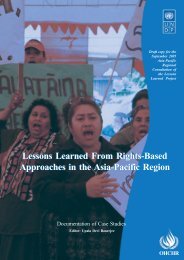View / Download - HRBA Portal
View / Download - HRBA Portal
View / Download - HRBA Portal
Create successful ePaper yourself
Turn your PDF publications into a flip-book with our unique Google optimized e-Paper software.
ForewordThis publication is the result of a collaborative effort among three regional programmes managed bythe UNDP Regional Centres in Bangkok (RCB) and Colombo (RCC). The Centres are regional hubs fordevelopment knowledge and expertise, providing policy advisory, programming and capacitydevelopment services. Inclusive Governance represents a priority area of work for UNDP in this region,examining the extent to which governance institutions provide space to overcome the systematicexclusion of disadvantaged groups seeking to participate in decisions affecting them.Lack of inclusive governance is widening the divide between rich and poor across Asia and the Pacific.Barriersto governance structures inclusive of disadvantaged and marginalized groups are preventing access by tensof millions in the region – women, indigenous peoples, people with disabilities, victims of natural disastersand others – to critical governance services, as well as preventing them from exercising their human rightsand achieving higher levels of human development. Political inclusion of such groups is essential toovercome the deeply embedded social inequities and economic inequalities prevalent in the region.Although national circumstances differ across the Asia-Pacific region, governments face a commonchallenge: to create an enabling governance environment that is not only aware of, and responsive to, theneeds and interests of the most disadvantaged and marginalized – but that also is willing and able toprovide sound, effective remedies to these groups’ concerns.This publication also examines the application of the principles of non-discrimination, participation,accountability and empowerment in governance arenas, and promotes the use of a human rights-basedapproach to programming on inclusive governance. Presenting lessons learnt in eight Asia-Pacificcountries through ten case studies, a strong case is made for greater inclusion in governance as part of theagenda to deepen and consolidate democracy, ensure effective representation, and develop capacities tobetter respect, protect, and fulfil human rights.We trust that this selection of case studies can contribute to a better understanding of issues of inclusionand exclusion experienced by disadvantaged groups in the region, and provide an insight into thestrategies appropriate for participatory interaction between these groups and governance institutions.Elizabeth FongRegional ManagerUNDP Regional Centre in Bangkokiii



